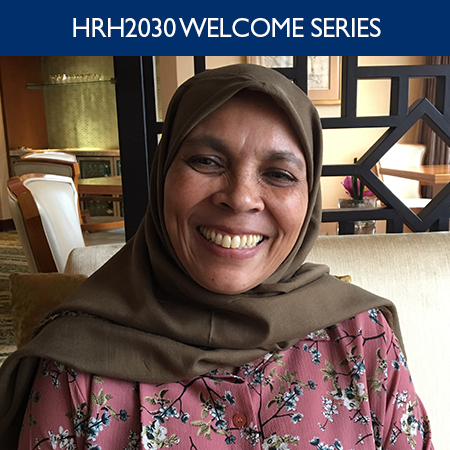
22 May Three Questions with Zubaedah Sjahrizal: Committed to improving Indonesia’s health system
Zubaedah (“Zuby”) Sjahrizal is the senior technical advisor for the HRH2030 activity in Indonesia. She brings a deep knowledge of Indonesia’s health system to her role, having more than 20 years of experience in the sector. Early in her career, Zuby was director of the Indonesian Planned Parenthood Association in West Nusa Tenggara; she has also worked with Oxfam Australia, the German development agency GIZ, and the Millennium Challenge Account Indonesia. Among her notable accomplishments, Zuby was an Ashoka Fellow in 2001.
- We would love to learn more about you! What inspired you to work in health?
I graduated from the University of Mataram with an agricultural engineering degree. I was then sent to work in many different villages in Eastern Indonesia, where I found poor health conditions. Our sanitation systems, maternal health, and environmental quality were quite poor at that time, many years ago. Seeing this, I decided to turn my life to be more focused on health. I joined an international organization, Project Appropriate Technology in Health (now known simply as PATH). I was lucky because I received many scholarships that supported my interest, such as four scholarships from the Ford Foundation to enroll in relevant short courses. Later, I completed my master’s in health planning and policy at the Leeds University in the U.K.
- Indonesia is home to a diverse population of more than 260 million people living across 17,000 archipelagos. In your opinion, what are some of the most significant challenges that health workers face in Indonesia?
I think the first one is our geography. We have remote areas, mountainous areas, well-forested areas, border areas, and then all the islands, so it isn’t easy for health workers to provide services to everyone where the services are needed. Access to health services is definitely a problem in this context.
The second one: We have about 1,000 local languages. Many of the people we serve in smaller villages are more comfortable with their local languages, and when we send a service provider to an island or province, that health worker might speak a different language than the client does. This is a barrier to providing quality care.
And the third challenge we face is a variation in quality among the institutions that are providing pre-service education to our health workforce. Some universities, polytechnical schools, and academic programs produce a high level of knowledgeable, skilled health workers. But there are others that are providing poor quality education—and thus produce poor quality health workers.
- Through HRH2030, how do you hope to improve in Indonesia’s health system?
We are working with the Ministry of Health to support the government’s health objectives, including improving the use of human resources for health (HRH) data for decision-making, especially to promote evidence-based planning for and deployment of the health workforce, as well as increased health worker retention. In collaboration with the World Health Organization, we are supporting the development and deployment of National Health Workforce Accounts and providing capacity building on data use through formal training and mentorship. In addition, we will help to facilitate site-level assessments of the HIV-focused health workforce in Papua, building on the prior HRH2030 HIV-HRH assessment conducted in Jakarta. We are also supporting the evaluation of the country’s Nusantara Sehat program that aims to provide access and equity in primary health services to the communities who live in the more remote geographies I mentioned earlier. This program focuses on the distribution of various of health workers—including medical doctors, dentists, midwives, nurses, and others—in those areas.
Photo: Zubaedah Sjahrizal smiles at the camera while at her office in Jakarta.





